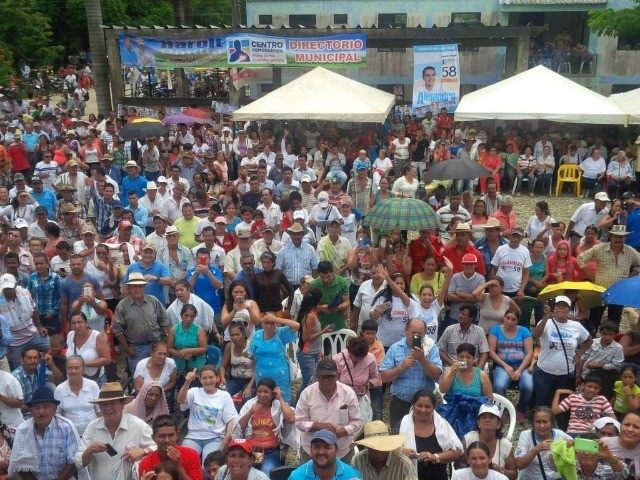Former Colombian president and current senator Álvaro Uribe claimed on Twitter that FARC terrorists “forbade” the local agricultural population from joining him at a political rally in the nation’s mountainous interior region on Sunday.
Uribe was visiting the mountainous region of Meta, posting photos of an event for his political party, the Democratic Center, in the city of Vista Hermosa. News reports indicate Uribe was in the area to talk to locals about problems they believe the legislature should be addressing more vocally.
While the crowd in the photos appears large, he claimed in a subsequent tweet that its numbers had been artificially deflated by threats towards locals who expressed interest in attending by the Revolutionary Armed Forces of Colombia (FARC), a half-century-old Marxist terrorist group.
“What a truce!” he wrote in Spanish. “Farc forbade peasants from meeting with us here in Vista Hermosa.” In its heyday, the FARC was highly active in the region, killing Colombian soldiers in Vista Hermosa as recently as 2005.
During his tenure as president in the mid-2000s, Uribe requested the aid of the CIA and President George W. Bush in weakening the FARC. Using counterterrorism strategies developed for use against Al Qaeda in Afghanistan, Uribe’s and Bush’s joint efforts were largely successful, eliminating most of the FARC leadership and forcing the rest into exile in Cuba. Despite actively providing a safe haven to the FARC leadership, President Obama opted to remove Cuba from the official State Department list of State Sponsors of Terrorism.
Despite Uribe’s efforts, the FARC remain extremely active and are currently the wealthiest non-jihadist terror organization in the world, second only to the Islamic State in overall profits. The FARC’s influence convinced current Colombian President Juan Manuel Santos to sit down with the group’s leadership in Havana. Alongside Cuban dictator Raúl Castro and FARC terrorist “Timochenko,” Santos announced a “peace treaty” in September that required the Colombian government to sentence any FARC terrorist convicted of “political crimes” to community service or house arrest, not prison time. Santos declared before the United Nations General Assembly in September that the treaty was a success and “the time of peace has come.”
Shortly after this announcement, Colombian officials announced a bizarrely-timed criminal investigation into Uribe for a mass murder incident in 1997. Uribe was governor of Antioquia state at the time, where the massacre occurred. The probe even raised concerns with the nation’s Inspector General, Alejandro Ordoñez, who suggested that the FARC had demanded Uribe go to prison as a provision of the peace treaty. “The FARC has always issued as a condition [of any deal] judicial proceedings against ex-President Uribe,” Ordoñez stated on Colombia’s RCN Radio. “That this announcement has been made can be explained as [the government] complying and has a direct relationship with these demands by the FARC.”
Less than a month after the announcement of the peace treaty, FARC leaders are hinting that they may disregard the treaty entirely. Any “interpretation” of the provisions of the deal would result in a void treaty, one leader said in early October. Another FARC negotiator questioned the military in a tweet Tuesday, accusing Colombian officials of “pressuring and provoking the guerrillas.”
Colombian government estimates suggest that 45,000 people “disappeared” during the FARC’s active existence. In a surprise announcement, Colombian officials say the FARC have agreed to help find the missing. There are no details as to how the process of finding tens of thousands of kidnapped and, in many cases, killed Colombians will occur, or whether the government will allow the FARC free reign of rural territories to allegedly go out and find the bodies of the victims. Fernando Vargas, the president of the National Committee of FARC Victims, has called this latest agreement “yet another mockery” of the victims of the FARC.

COMMENTS
Please let us know if you're having issues with commenting.